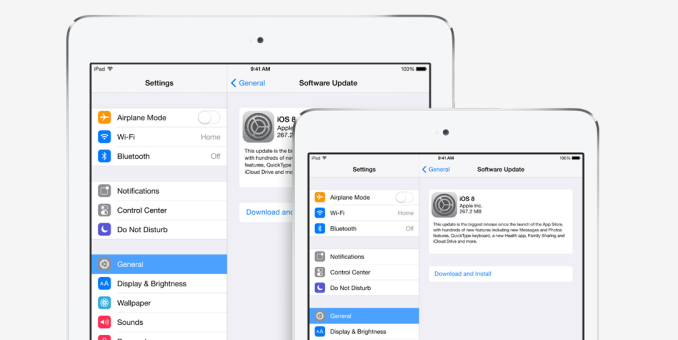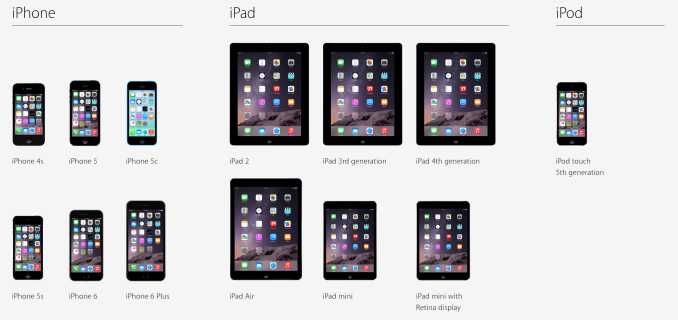The iOS 8 Review
by Brandon Chester on September 17, 2014 1:00 PM ESTIt's hard to express how I feel about iOS 8. On one hand, it's a massive release for developers and those new tools and APIs will eventually translate into better and more functional applications for users. From this point of view, iOS 8 could be considered even more exciting than iOS 7, but from the perspective of a user there's no real wow factor with iOS 8 right now.
There are some great new features like SMS Relay and Handoff, but they require being a user with multiple Apple devices, and the former isn't here yet. That isn't to say that users with only an iPad or an iPhone are left out. The improvements across iOS in apps like Messages and Photos are solid improvements, and features like Actionable Notifications finally address complaints that have existed for years. But a great deal of the additions are currently just a promise that great things are coming from the developer community, and many of the most exciting features that can be used right now are part of continuity.
As someone who does use multiple Apple products, I'm happy with what Apple has brought in iOS 8. I think many of the continuity related features are things that are very hard for another company to replicate without the control over hardware and software that Apple maintains. When I imagine myself as a user who can't take advantage of the new features given to users of multiple devices I believe I would still be pleased with what iOS 8 brings to the table, but not to the degree I was when iOS 7 was released.
Many of the improvements are in areas of the OS that have long needed to be improved or changed. There are also number of additions that take a great amount of inspiration from other mobile operating systems. While this may be seen as copying by some, for users the end result is that their experience is improved and they have features they did not have before, which is what really matters. Apple looking to other operating systems to see what deficiencies they need to fix in their own ultimately benefits users.
iOS 8 runs on all the devices shown above. It's great to see Apple supporting devices like the iPad 2 that launched in 2011, but I'm not without my concerns, primarily regarding Apple's A5 devices and all iPads in general. Even under iOS 7.1, the UI smoothness on devices like the iPhone 4s and the iPad 2 is far from exceptional. That performance doesn't get any better with iOS 8, and I believe that users of those devices may want to try out the iOS 8 experience on someone else's device before upgrading their own.
The iPad concerns in particular are ones I've had since iOS 7 initially launched. For about a year now I've felt that the iPad build of iOS has been neglected by Apple. The Springboard crash bug that took until iOS 7.1 to patch crippled my iPad Mini with Retina Display. If a similar bug had widely affected iPhones I believe it would have been patched much sooner. Other various bugs and performance issues that existed on the iPad but not my iPhone resulted in me eventually selling it. Many of these still remain today, and iOS 8 even introduces some issues of its own.
Given that the iPad 3 I have for testing falls into both the Apple A5(X) camp and the iPad camp, I won't be updating it to iOS 8. While the new features like SMS Relay will be nice, the missing features and issues like keyboard lag outweigh the benefits of updating.
Despite my concerns, iOS 8 makes me feel excited for the future more than anything else. Apple's steps to open up more options for customization by developers and users on iOS marks a significant departure from their previous releases. It's not Android but it isn't meant to be. It brings new features and capabilities that are implemented in a very Apple-like manner, for better or for worse. I don't think it's going to do much to sway Android fans toward iOS, but it gives a lot of reason for current iOS users to stay with Apple. This is especially true for users who can take advantage of continuity. iOS 8 feels like another step in the maturation that began with iOS 7. Most exciting of all is that it's still only the beginning.












164 Comments
View All Comments
KoolAidMan1 - Thursday, September 18, 2014 - link
That's because iOS 8 is mostly an under the hood update for developers to further increase performance and functionality. SceneKit, Handoff, Metal API, etc.Tech stuff, not shiny gimmicks like we know you're into
Donkey2008 - Friday, September 19, 2014 - link
Oh look. Another smarty comment from an Android fanboy. Seems like its been 1-2 minutes since we heard one. Glad to know that the biggest douches on tech forums (Android owners) are still on top of their game.sprockkets - Saturday, September 20, 2014 - link
Sorry if you think that is a "smarty" comment from an Android owner.After 143 comments, as usual, darwinosx hasn't bothered to say one word of praise about this update, yet he/she will always be trolling any story about android or a device running it.
Grow some skin - darwinosx in comparison spews nothing but bullsht.
Axee7 - Tuesday, September 23, 2014 - link
DOn't buy iPhone 6 Plus.. Its huge and over thin and it get bent so easily.. I just saw horrifying pics here :( read more on AxeeTech dot comzepi - Wednesday, September 17, 2014 - link
"Not everyone has an Apple device and therefore not everyone has iMessage."And this renders whole iMessages almost useless. Why on earth would one use it in the first place when free crossplatform apps are available?
p_giguere1 - Wednesday, September 17, 2014 - link
Because you don't always know whether your recipient has the necessary app installed and their account info when necessary. For a lot of people you text and you are not necessarily very close to, it's just awkward/long to ask "Do you have Hangouts? What's your Google account?", so you'll just send a regular text. That's where iMessage is relevant. In this case, the question is more like "Why on earth would one NOT use it rather than a regular text", since it's literally as easy as sending a text and only have added benefits.Ancillas - Wednesday, September 17, 2014 - link
On an Android phone, Hangouts and SMS are integrated into one view, just like SMS and iMessage.The difference is that when I send a message from my iPhone to my buddy who has an Android phone, he can't use iMessage because he doesn't have Apple hardware. That's absurd. I'll just install Hangouts, and we get all the same features.
Along the same lines, if I want to have the ability to take my iMessage conversation off of my phone and on to my computer, then I have to have OS X. Again, that's crazy. Using Hangouts, I just hop on to a browser on any computer, and I have all my messages right there.
PalmOS did this right by putting Google messages inline with SMS messages (along with other providers). Apple could do this, but they won't because they want to protect their ecosystem. I will not endorse that closed-model design, even though I use iOS. I choose to use the Hangouts app in iOS, but I don't use Hangout for SMS (even though it is supported).
steven75 - Wednesday, September 17, 2014 - link
What's absurd is expecting everyone to have or create a Google account in order to use Hangouts. SMS is universally supported.Impulses - Wednesday, September 17, 2014 - link
SMS has many serious issues, it's time for something better... If iMessage supported a universal protocol it'd be the bomb, but Apple would never do that.cj100570 - Wednesday, September 17, 2014 - link
You must be confused, you don't have to create a Google account to use Hangouts for SMS. Never have. If you set Hangouts as your SMS app it merely takes the place of the default app.